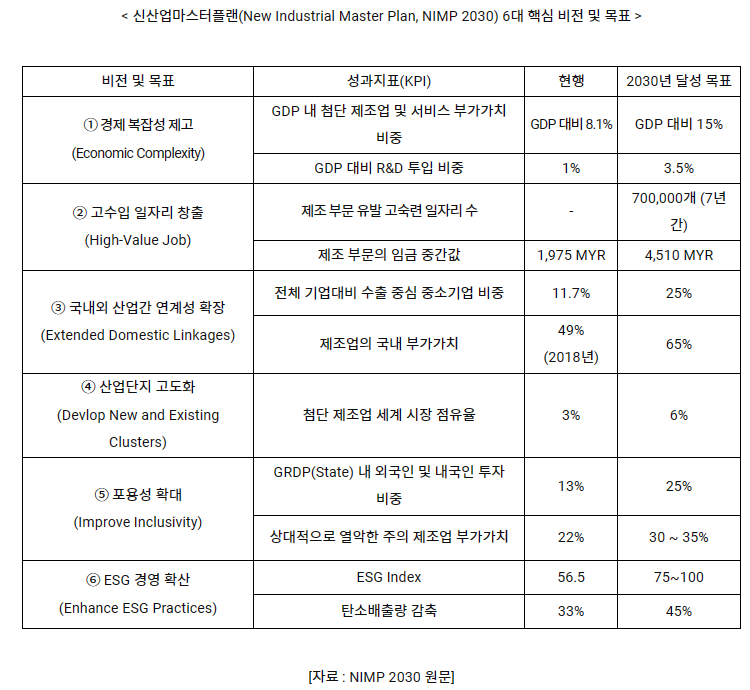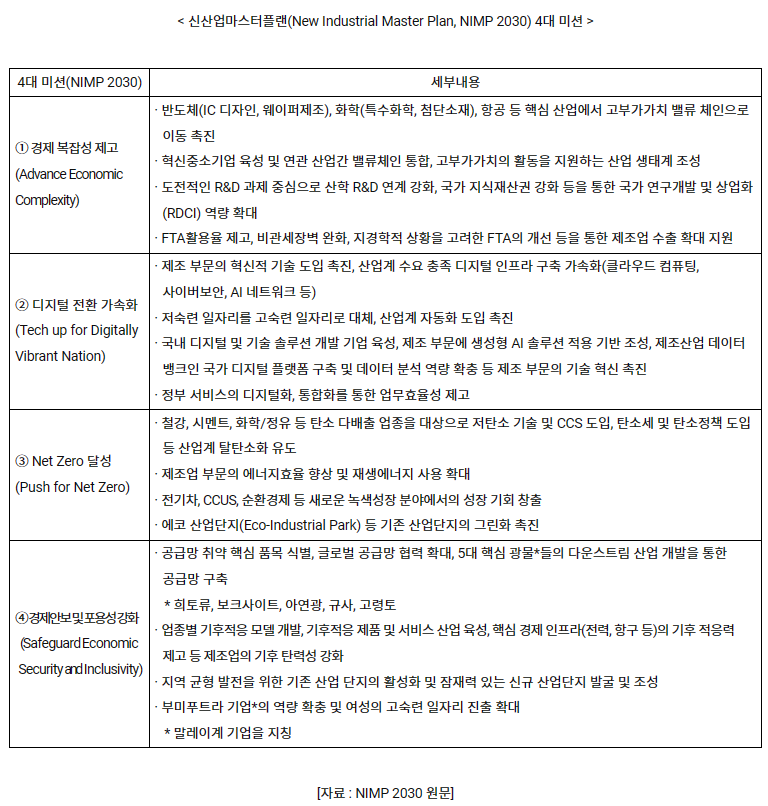Introduction to national and sector-level initiatives
Reforms to strengthen the foundation of Malaysia’s investment ecosystem
Background of NIMP appearance
NIMP 2030 is a key component of the Madani Economy initiative, the core political philosophy of the current Anwar government, and is a white paper containing a development strategy for the manufacturing and related service industries with a 2030-year horizon until 7. Since 1986, three Industrial Master Plans have been announced, and this strategy is the fourth announced. The current government's key goal is to become an Asian economic leader by transforming the industry in line with global trends such as strengthening economic security and spreading digital transformation.
Main vision and goals
Through the new industry master plan, the Malaysian government set six visions and goals, including high-tech industries, expansion of high-skilled job creation, and strengthening the competitiveness of small and medium-sized enterprises. To achieve the core goal, four core missions, including improving economic complexity, are also presented, and the details are summarized as follows.


Implementation plan
In order to systematically implement NIMP 2030, the Malaysian government announced in a white paper that it will form and operate a public-private joint national NIMP 2030 Council chaired by the Prime Minister. It is planned to inspect implementation through the establishment of the 2030 Delivery Management Unit under Malaysia International Trade and MOTIE (Ministry of International Trade and Industry, MITI) and invest 7 billion ringgit of government resources with the goal of attracting a total of 950 billion ringgit investment over 82 years. revealed. In addition, it was announced that it plans to support the procurement of additional financial resources through the operation of public-private joint funds such as the NIMP joint investment fund and NIMP industrial development fund.
Key industry reactions to NIMP 2030
As the new government's national development plans began to emerge in the first half of last year, they are gradually becoming concrete through white papers such as NETR, NIMP2030, and MADANI Ekonomi. The Malaysian government is confident that these specific policy implementation plans will greatly help Malaysia's economic development. So what is the local industry’s response to NIMP 2030? KOTRA Kuala Lumpur Trade Center conducted interviews with industry workers in each of the major industries highlighted within NIMP 2030, and the opinions of experts in each field expressed to local media outlets are summarized as follows.
[Malaysia IT Association (PIKOM) – Mr. Ong]
PIKOM is the association with the largest number of member companies in the Malaysian ICT industry, with over 1,000 member companies, which account for 80% of the entire technology business in Malaysia. As the voice of the technology industry, PIKOM's mission is to grow the size and capabilities of Malaysia's technology industry by creating opportunities for not only its members but all Malaysians to benefit from technological advancements.
When asked about the government's thoughts on the government's ICT-related support measures, including NIMP 2030, through an interview conducted with a trade official, he said that the government's intention to focus on the cutting-edge ICT field in line with global trends is viewed very positively. According to him, he emphasized that if cutting-edge technologies emphasized in NIMP 2030 and Industry 4.0 are introduced, all existing industries can benefit. It was revealed that when most factory processes are automated to improve equipment operation rate and reduce downtime, cost reduction and productivity improvement can be expected. Examples of smart manufacturing plants in Malaysia include Hartalega (a glove manufacturer that produces 440 billion units per year), Proton (Malaysia's leading automobile manufacturer), and F&N (Malaysia's largest F&B company using smart logistics).
However, it was emphasized that securing a source of financing is the most urgent task as it requires enormous R&D investment costs in order to introduce digitalization in the Malaysian manufacturing sector in earnest. In particular, it was revealed that the budget decided by the government through NIMP 2030 is not sufficient to achieve digital transformation in Malaysia. In order to encourage the participation of many domestic and foreign companies in local digital transformation, more diverse investment incentive plans will be needed. In particular, incentive support for companies with excellent digital status (Malaysia Digital Status) provided by the Malaysia Digital Economy Corporation (MDEC), He also emphasized that this can only be achieved if support measures such as tax exemptions and relaxation of foreign worker employment requirements are expanded. At the end of the interview, he pledged that PIKOM will also contribute to achieving the acceleration of digital transformation, which is the core mission of NIMP 2030, by forming a consensus on national digitalization and creating an environment where everyone can focus in the country for a long period of time. reported.
[SME Association Malaysia President Ding Hong, Malaysian Small and Medium Business Association]
ESG areas such as achieving Net Zero, which are being emphasized simultaneously with the acceleration of digital transformation, are also one of the current government's areas of greatest interest. In Malaysia, government agencies, including the Securities Commission (SC), are also making efforts to support companies' ESG transition. Regarding the ESG transition and the policies of NIMP 2030 felt by small and medium-sized enterprises, which make up the majority of Malaysian companies, an official from the Malaysian Small and Medium Business Association expressed the following opinion in an interview with a local media outlet.
There may be benefits that companies can gain through ESG transition, but Malaysia currently lacks clear standards and guidelines for small and medium-sized enterprises, and many SMEs in Malaysia still do not even know the meaning of ESG management. Over the next seven years, as NIMP 2030 pursues manufacturing innovation, the small and medium-sized business community will need more networking to take the next step toward automation and digitalization, and will also need support from relevant authorities. I believe that small and medium-sized businesses need to be aware of exactly what they need to do for corporate development, such as improving the skills of workers. As small and medium-sized businesses account for 7% of registered businesses in Malaysia, the 97.4 budget scheduled to be announced in October expressed the opinion that it would be good to include meaningful investment support measures from the government to help small and medium-sized businesses adopt eco-friendly technologies and ESG.
[Malaysia University of Science and Technology, Professor Dr. Geoffrey Williams]
According to an interview conducted by Professor Geoffrey Williams of the Malaysian University of Science and Technology with a local media outlet, in order to implement NIMP 2030, a total investment of 7 billion ringgit is required over 950 years according to the government's announcement, and the government has so far invested 10 billion ringgit, which is about 82%. It has been announced that it is a plan. However, in order to implement the great transformation of the industry, which is the ultimate goal of this white paper, the budget is still too small and the period is too short to expect meaningful results. He also emphasized that it may be more effective to focus on existing industries rather than entering new high value-added industries. In the case of the pharmaceutical industry, which is mentioned as a core development industry within NIMP, the foundation is so weak that Malaysia's largest pharmaceutical company is classified as PN17*. It was revealed that it would take a lot of effort and time to stand shoulder to shoulder with big pharma companies such as Pfizer, AstraZeneca, or India's Ranbaxy, which dominate the global pharmaceutical industry.
* PN17 (Practice Note 17): Rating of companies with poor financial status announced by the Malaysian Securities Commission (SC)
implication
NIMP 2030 is a core component of the MADANI economy that forms the basis of the current Anwar government and specifically presents the development direction and strategy for the seven years until 2030. It is especially meaningful in that it presents the government's strong will and active implementation plan for digital and ESG transformation in line with global trends, and it has been confirmed that this move is receiving a positive response from the local community. In particular, as it shares a similar direction to Korea's industrial policy, the manufacturing and eco-friendly manufacturing sectors being promoted between the two countries are expected to gain further momentum. However, in order to achieve the 'great transformation' of the industry that the government is currently pursuing in order to respond to digital and climate change, there appears to be a need to listen to the voices of the industry and the challenges of each sector.



